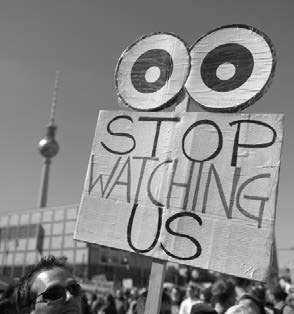Why We Need Privacy Rights
by Daelphinux
Note: This article is written from a very American point of view; there are people in this world who do not have these rights and freedoms. In addition to our responsibilities below, it is our responsibility to ensure these people learn about these rights and fight for them.
Privacy is one of those things that I am never really sure people understand. I do not know how good a job I am going to do here explaining it, but I am certainly going to try. One of the most important things in a free society is the ability to have one's own thoughts and ideas, one's own predilections. When the society removes the right to privacy, in addition to security, they remove the right to have those personal beliefs and feelings.
It is, even, a flawed concept to say that in a society where privacy has been eradicated, the society would be secure. Privacy is not the shield criminals and terrorists hide behind. Criminals and terrorists hide; it is simply what they do. Whether or not there are rights to hide behind, they will still hide. Dissidents exist in even the most intolerable and corrupt regimes in world history, on both sides of ethics no less. Vichy France had the Resistance, and modern China has Free Tibet. Even in regimes where resistance is routed out and actively fought, sacrificing the right to privacy will never provide one with protection. You just trade one dictator for another.
What is becoming a common theme is the current push of governments to limit or even criminalize encryption. Making encryption illegal will not prevent criminals from using encryption; it will just make it easier for criminals to commit cybercrimes against law-abiding citizens.
If one were to decide to take personal images of themselves and various acquaintances, but wanted those images to remain private, they might encrypt these files. This, if encryption were deemed illegal, would make this person a criminal. Meanwhile, if they were to not encrypt these files (in the world of no encryption), an attacker would easily be able to gain access to these files and distribute them against the wishes of the owner. There may be laws against this act as well, but the legal system is not a perfect protector. If it were, the files would never have been able to be accessed anyway. We must, as individuals, demand to be allowed to keep certain things private - in any way we are able to. The world of the Internet is already making it difficult enough to have a personal life.
Meanwhile, the societies that end up having the least problem with dangerous groups are the ones that advocate for privacy and freedom. In a free society, people are able to express their views and the society is able, in that way, to self-censor as it were. For instance: In the United States, there are known affiliates of various bigotry organizations, or individuals who express populist views (such as American hero Kim Davis). This means that, as these views are publicly expressed, people are able to choose who they affiliate with and whether or not these people should be allowed to integrate with society as a whole.
In a world where privacy is protected and the right to have whatever views one desires is protected, people feel safe in expressing those desires (as they should) and they proceed to do so. This is what allows dissidence to be found and, more importantly, responded to. When dissidence arises in this way, problems are resolved, and the dissidence is not left to brew and grow into a violent uprising. In fact, it is this discourse, brought about by our rights to have free thought and speech, that allows for an effective democracy to exist.
With these things in mind, we have the responsibility to ensure that no one takes these rights from us or anyone else.
We have to fight for privacy and freedom.
Without these things no one knows what kind of world we would live in.
